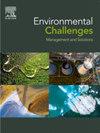丽江流域乡村振兴的生态环境保护与治理——以青石滩水库为例
Q2 Environmental Science
引用次数: 0
摘要
青石滩库区由于其独特的地理位置,在整个丽江流域生态环境保护中起着至关重要的作用。然而,法律领域对青石滩库区生态环境的研究还很缺乏。为了解决这些差距,本研究旨在考察丽江流域的乡村环境保护和环境治理,重点研究乡村振兴战略的实施。本研究在青石滩库区采用问卷调查和访谈相结合的方法进行研究。问卷采用整群抽样法选取95个样本完成,采用方便抽样法选取15个受访者。进行描述性统计、多元回归分析和专题分析。研究结果表明,需要加强立法协调,平衡经济增长和环境保护,加强水污染管理,发展生态旅游和生态产品,促进生态补偿政策。多元回归分析表明,影响丽江流域农村生态质量的预测因子包括地方积极参与环境保护、多部门有效协同管理、法律法规保护和公众参与。关于关键方法,未来的研究应包括来自所有区域的数百名答复者的更大样本。此外,调查问卷和访谈项目应根据丽江流域中下游地区的生态条件量身定制。对生态文明建设和农村治理的法律框架进行进一步分析。本文章由计算机程序翻译,如有差异,请以英文原文为准。
Ecological environment protection and governance for rural revitalization in Lijiang River Basin, China: A case study on Qingshitan reservoir
Due to Qingshitan Reservoir area’s unique geographical location, it plays a crucial role in the overall ecological environment protection of the Lijiang River Basin. However, there is a lack of research on the ecological environment of the Qingshitan reservoir area in the field of law. To address these gaps, this study aims to examine rural environmental protection and environmental governance in the Lijiang River Basin, highlighting the implementation of the rural revitalization strategy. This study employed a mixed-methods approach to administer a questionnaire and conduct interviews in the Qingshitan Reservoir areas. The questionnaire was completed by 95 samples chosen via a cluster sampling method, whereas 15 interviewees were selected through a convenience sampling method. Descriptive statistics, multiple regression analysis and thematic analysis were performed. The results indicated a crucial need to improve the coordination of legislation, balance economic growth and environmental protection, boost water pollution management, develop eco-tourism and ecological products, and promote ecological compensation policies. Multiple regression analysis revealed that the predictors influencing ecological quality of the rural areas in the Lijiang River Basin include active local participation in environmental protection, effective multi-department collaborative management, law and regulation protection, and involvement of public. Concerning key methodology, future research should include a larger sample of hundreds of respondents from all regions. Additionally, questionnaire and interview items should be tailored according to the ecological conditions of the central and lower regions of the Lijiang River Basin. Additional analysis of the legal framework for ecological conservation and rural governance should be conducted.
求助全文
通过发布文献求助,成功后即可免费获取论文全文。
去求助
来源期刊

Environmental Challenges
Environmental Science-Environmental Engineering
CiteScore
8.00
自引率
0.00%
发文量
249
审稿时长
8 weeks
 求助内容:
求助内容: 应助结果提醒方式:
应助结果提醒方式:


